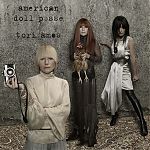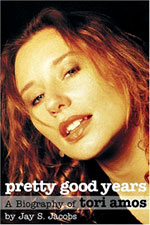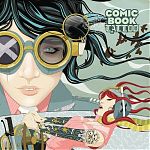- Articles
- Cherries
- Minutiae
- Q&A
- RAINN
- Releases
- Reviews
- Site News
- Them
- Toriphiles
- Touring
- TV/Radio/Web
- Video
News Archives
Keep an eye on our Twitter and Facebook pages since we often post quickie updates there when we're on-the-go.
During tours, we do our best to cover setlists in real-time on Twitter. If you want to tweet a show in, just DM or @ us on the day and tell us to watch your stream that night.
Tori is touring in 2017 to support the release of Native Invader. The European legs runs from early September through early October and the North American leg runs from late October to early December. We do not know if additional dates elsewhere will be added.

Native Invader (album, 2017)

Unrepentant Geraldines (album, 2014)

Gold Dust (album, 2012)

Night of Hunters (album, 2011)

Midwinter Graces (album, 2009)
 Abnormally Attracted To Sin (album, 2009)
Abnormally Attracted To Sin (album, 2009)
Live at Montreux 1991/1992 (DVD, 2008)

American Doll Posse (album, 2007)

A Piano (boxed set, 2006)

Pretty Good Years
(bio, 2006)

Fade To Red
(DVD, 2006)
 Comic Book Tattoo (book, 2008)
Comic Book Tattoo (book, 2008)News: New York Times Interview (December 4, 2012)
The energy has to be put into making the work vital, and not settling for something that is just good, because there’s no room, don’t you see? When you’re in your 20s, there’s maybe a little room for you to not be at the top of your artistic game, if you look good on a magazine cover. When you’re not on the cover of the magazines anymore, then you realize that the work has to be great.
Joan Anderman interviewed Tori for the New York Times and the resulting article was posted earlier this week in Booming, The Times’ baby boomer-focused TimesTopic section. The interview is a reflective one, dealing creativity, parenting and ageing — mirroring nicely Anderman’s blog, Middle Mojo, which deals with much of the same topics. Hopefully, the full interview will show up there eventually…
Tori Amos Still Wrestles With Her Muses
By JOAN ANDERMAN
Published: December 4, 2012
Over the past two decades, Tori Amos has sold more than 12 million albums and influenced a generation of singer-songwriters with pop songs that fuse the brashness of rock, the poetry of mysticism and the politics of gender and survival. A late baby boomer who is now 49, Ms. Amos this fall released “Gold Dust,” a career retrospective recorded with the Netherlands’ Metropole Orchestra. She called recently from a Paris hotel to talk about art and aging.
The following interview has been condensed and edited.
Do the muses visit you with the same frequency and intensity they did 20 years ago?
They can be quite ruthless, so I’m not going to say to you that it’s an easy collaboration, because it isn’t. It’s not as if I snap my fingers and greatness comes. A lot of my interpretation of what I’m hearing, sometimes I’m throwing 60, 70 percent of it away, because the magic isn’t there. It’s about having endurance. That’s important. There are ways to stimulate being prolific, and part of that is making pilgrimages, and being open to listening, changing up the routine. Take a different route to the coffee shop to see what you can see and hear. When we get in a routine we can become zombie-like and shut down. It’s about discipline. You have to push yourself.
Speaking of which, you’ve been working on a musical and I gather it’s been arduous, personally and professionally.
Nick Hytner, who runs the British National Theater and has been the mentor for “The Light Princess,” told me years ago that writing a musical is a glorious nightmare, and it’s come to be true. It has been arduous, but that’s O.K. What I will say to you is I’ve had to really learn what being part of a creative team is about. Everybody has had to really put their heart and soul into it, look at our own relationships with our own parents, and it’s affected all of us.
You’re the parent of a daughter, a preteen. What kind of impact do mothering and making art have on each other?
Tash [Natashya, Amos’s child with her husband and sound engineer, Mark Hawley] is now 12, and she’s in boarding school. It was her choice. She wanted to go to Hogwart’s and ended up at Sylvia Young Performing Arts School in London. Tash is an only child so we have a different relationship than if she had siblings, and my mom has been influential in that over the years. She’s always said to me, “Look, the musician who’s so critical needs to take herself off.” And that’s what I’ve been doing over the years. I travel a lot and write. And that way when I’m with Tash, stepping into the mother role, I don’t need to bring that overly critical songwriter into everything I do. As my mom said to me, “Nurture. Be supportive. You don’t have to agree with everything but you don’t need to be the harsh critic with those that you love.” I can see how the young girls really get hurt when their moms are critical, or vice versa when they’re overly critical of their moms. It can be so painful. Tash has quite a sense of humor and she’ll say to me, “What do you think you’re walking out of this hotel in?” And I’ll say, “It’s comfortable.” And she’ll say, “No soccer mom is walking out of this hotel room. You’ll be called Tori Anus.” It’s kind of funny that I have a daughter who understands.
Yeah, the fact is we live in an ageist society, particularly in regards to women, and the field you work in is especially brutal. How has our cultural obsession with youth affected you personally? How do you deal with it?
I’m glad you brought it up, because it’s reality. It’s so obvious to me but sometimes I find that the masses don’t want to look at it. The question is what comes first, the culture being open or the women that strive forward through that jungle with their machete to create the work that inspires? If you and I are waiting for the culture to change, we might die before that happens. Therefore it’s about refusing to have that projection put at my feet, and pushing through, and creating. You know, you have to. There’s this line in “Job’s Coffin” about how you must out-create that destructive tendency, and so it’s about out-creating destruction, even destructive thoughts.
You’re luckier than most, with a devoted fan base and vitality and a record contract. But getting older in the music business has got to be psychologically or spiritually trying. Correct me if I’m wrong..
Yes, yes, yes, of course it is, but you have to discipline the mind, discipline the will. You have to be a warrior. You have to fight the belief system. It’s the only way or I become president of Victims Anonymous. And so we’re back to the work. The energy has to be put into making the work vital, and not settling for something that is just good, because there’s no room, don’t you see? When you’re in your 20s, there’s maybe a little room for you to not be at the top of your artistic game, if you look good on a magazine cover. When you’re not on the cover of the magazines anymore, then you realize that the work has to be great. And in order for that to happen we’re back to traveling, being open to stories, being open to creating whatever you need to create in order to stand back and say, “I respect the work with all my heart and soul.”
You’ve said that songs take on new identities over time because the audience collectively imbues them with fresh meaning.
That’s right. The muses, the nine women that have been with me since I can remember, since maybe 2-and-a-half, they push me and point me into open listening and the songs themselves appear as geometric shapes. I got a D in geometry so I can’t tell you what shape. But as I get to know them, as I’m performing them and as the years go on, the shapes expand, in a way. Each time I enter it the song might show me something different than I’d seen before because of what you just said, because the collective has an experience with it, a perception of it that I didn’t have. And the muses will tell me, “Look, Tori, you need to listen to this. Just because this isn’t your experience of it doesn’t mean the song doesn’t hold that experience.”
So I keep learning who they are.
Is it a challenge to separate your sense of yourself as an artist from your value in the marketplace?
I think it’s about pragmatism. And understanding that to know your own mind, a magazine cover doesn’t give you that, and it’s something that I’ve really begun to value. Would I trade it for not knowing my own mind when I was 32? No. You see, you gain different things.
What have you gained?
Listening. Becoming a good listener. I didn’t listen in my early 30s. I would have told you I listened, but it was all talking, talking, talking, explaining, blah blah blah. Output. But now I’m observing, listening, watching the older woman on the train, she catches your eye, she says, “where are you going?” And you say, “I’m on my way to New York.” And she says, “Oh, I was there, when my husband was alive, 12 years ago.” And then if you just listen she will tell you one of her most intimate feelings, and I realize she’s just given me gold, and over the next few months the muses will say to me, “O.K., this has become part of our palette, part of our sonic palette. We will be building with these stories a new expression.” You have to remind yourself, you and me, whether it’s songs or books or articles, we are documenting what it is like for women in the late 20th, early 21st century, for ages to come. There’s a huge responsibility stepping into the fellowship of writers.
What have you lost to time?
My anger. My self-righteous anger.
Does that feel like a loss?
No. But it’s gone.
Anger was fuel, I imagine.
Oh, yes, it was fuel. Go watch a live performance of “Professional Widow” on the 1995 tour. I couldn’t sing that now if my life depended on it. But if you’re still carrying the same anger at 49 then you really haven’t learned the art of transmuting. And that would mean that everybody else who came to the shows got something, but I missed it.
Do you look back with misgiving on choices that you’ve made?
Sure. I went up against the suits in the mid-‘90s the wrong way. We’re back to the anger. There was a way to deal with some of the injustices that were happening in the business and if I could go back, if I were dealing with it now, it would be a very different outcome, possibly, because I let my anger get the best of me. You know that saying, be smart not right? I was right, not smart.
Do you have a to-do list? What would you like to accomplish?
I would love to compose something for dance before I kick the bucket, and I’m not closed-minded about the dance, or the dance company. I would really just love to collaborate on that. You know, people ask me, “Why the Dutch orchestra?” And it’s like asking, “Why is she dancing with that guy?” It’s because he asked her to dance. The Dutch orchestra is the only one that ever asked me.
That’s an honest explanation.
Sometimes I tell that to men and they just crack up. I think for a lot of them, it just never occurs to them to ask.
Do you ever grow weary? Have there been times when you’ve considered stepping away?
Of course. All the time. On a project there’s that bad point, because the projects push you, and as soon as you think you’ve gone as far as you can go you they push you further and you break through to the other side. The thing we were talking about before, the listening to the muses, you have to be willing to open yourself up, and not everybody wants to do that anymore as they get older. I don’t want to drag Tash through it, and I don’t want to drag Mark through it. Tash will say sometimes to us, wherever we are in the world, “Can I have my parents back, please?” And we’ll think, OK. Fair enough. So we’re learning that we then have to step into another part of ourselves.
There is a time and a place for things. Sometimes one needs to put a filter on oneself. That can be a good thing.


